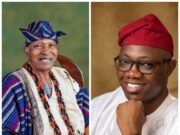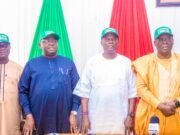There is a need to review the political architecture of the country to allay the mutual fears that the component units hold.
Chairman of the Nigerian Communications Commission, NCC, Prof Adeolu Akande, who was a keynote speaker at the 2020 law week of the Nigerian Bar Association, Ibadan Chapter, made this known
According to Akande, who is the director at Igbenidion University’s Centre for Presidential Studies, “This is the fear that remains at the background of agitations for restructuring, power sharing, rotational presidency, tripartite Vice Presidency, unicameral legislature, the reduction of power at the federal level, the control of the police either in the form of state police or community policing, revenue allocation disputes or controversy.
Quoting Professor John Ayoade, Akande said that many states have abdicated their responsibilities to their citizenry so much that it has become reasonable to assume that citizenship, which connotes some duties of the state to her citizens, no longer apply.
“The first task before Nigeria is to define its terms of engagement. These efforts were commenced under the colonial rule, but as indicated above, they were not far-reaching enough to allow the resolution of the nagging problems by coming into creative agreements that will allay the fears of the composing units of the state. Nigerians today live with the fear of one another. The South is afraid of the North because of its dominant population. The North is fearful of the South because of its advancement in the acquisition of western education and the likelihood of the state if left open to competitive meritocracy.
“The truth is that neither of the two fears could be dismissed without putting the future of the country at risk. There is a need to review the political architecture of the country to allay the mutual fears that the component units hold. This is the fear that remains at the background of agitations for restructuring, power sharing, rotational presidency, tripartite Vice Presidency, unicameral legislature, the reduction of power at the federal level, the control of the police either in the form of state police or community policing, revenue allocation disputes or controversy.
“These motley issues,” Akande added, “have been complicated by the glaring inefficiency of the state bureaucracy to provide the goods and services which Nigerians crave. These are structural and endemic problems to which every leadership in the country may end up being captives to unless they are addressed.
The state has inherited problems which are not of its making. Many were defined before colonialism. The pattern of incorporation created some into the colonial state while some were re-informed. There have been further complicated caused by the failure to address these challenges early after independence and the further entrenchment of new challenges by the nature of leadership provided by successive governments. It is needless to say that while the nature and character of the post-colonial state created some of these problems, new problems were created by some of the government that in their conduct further compounded the problems they inherited.”


































